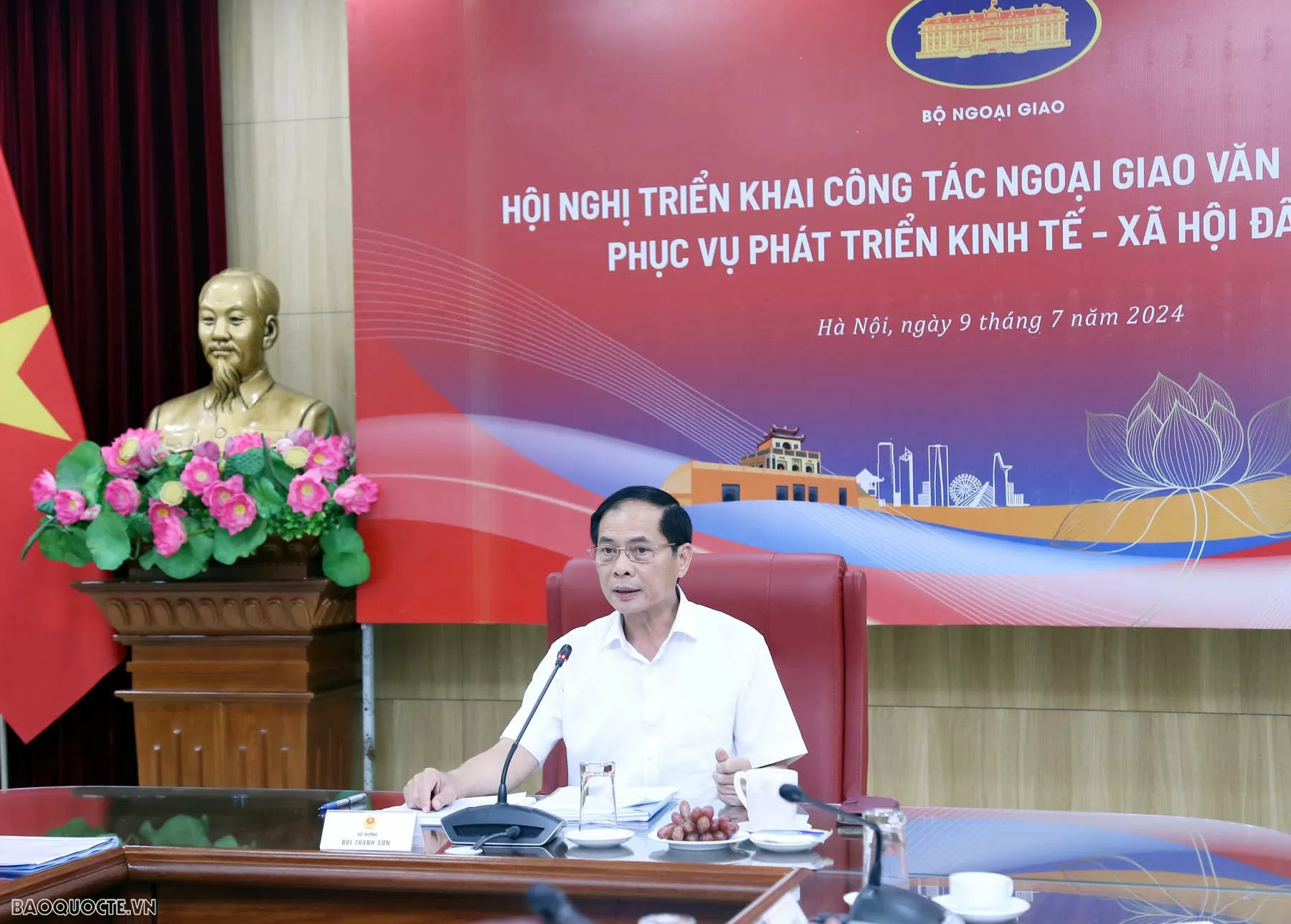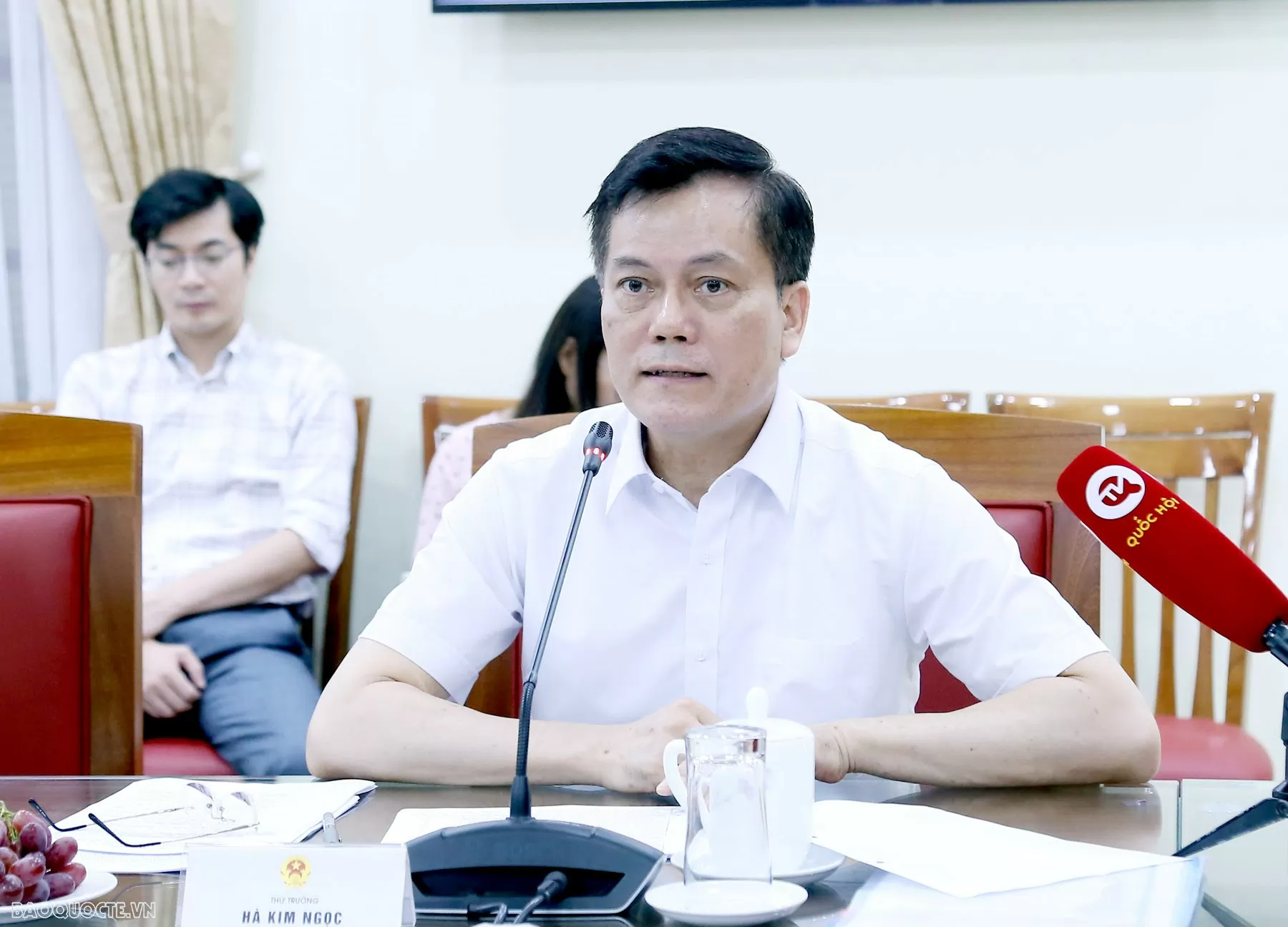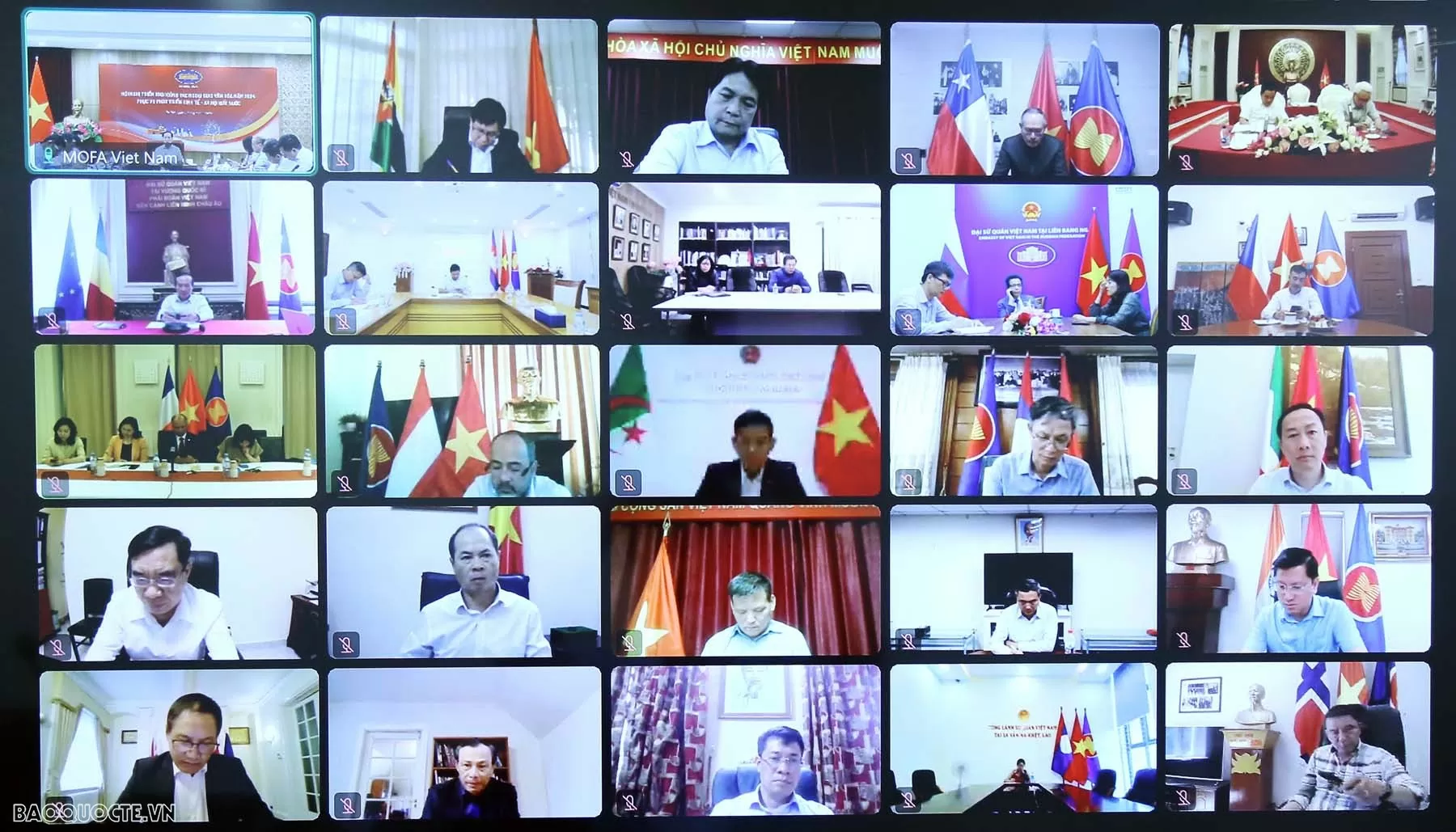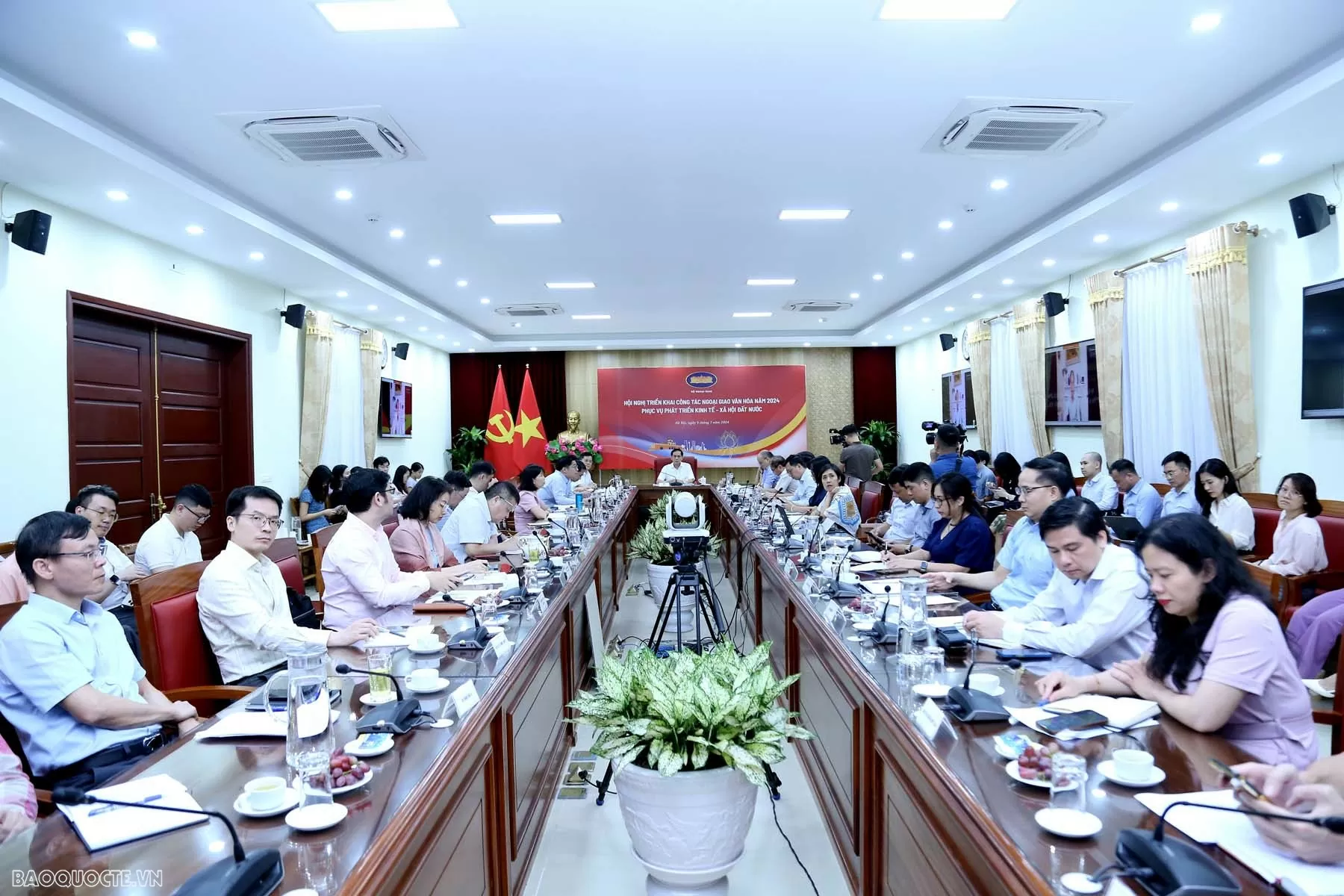
Cultural diplomacy: The core foundation shaping Vietnamese diplomacy’s identity for sustainable development
Latest
On July 9, Minister of Foreign Affairs Bui Thanh Son chaired the 2024 Cultural Diplomacy Deployment Conference at the Ministry of Foreign Affairs headquarters. The conference, attended by Deputy Foreign Minister Ha Kim Ngoc, 94 Ambassadors, heads of Vietnamese representative agencies abroad, and leaders of functional units within the Ministry, aimed to explore how cultural diplomacy can contribute to the nation’s socio-economic development.
 |
| Foreign Minister Bui Thanh Son speaks at the conference on the cultural diplomacy work for 2024. (Photo: WVR/Quang Hoa) |
In his opening remarks, Minister Bui Thanh Son observed that the world is navigating a new, complex global landscape characterized by multipolarity, diverse centers of power, and multifaceted challenges. This landscape is marked by intensified strategic competition, increasingly complex geopolitical hotspots, and a wider range of traditional and non-traditional security concerns. Within this context, cultural diplomacy is gaining recognition as a valuable tool for bridging divides, fostering understanding, building trust, and promoting cooperation among nations.
Minister Bui Thanh Son affirmed that, given the nation's newfound strengths and the demands of the evolving global landscape, cultural diplomacy must be elevated to equal standing with political and economic diplomacy. This will ensure its crucial contribution to the successful implementation of foreign policy, the achievement of rapid and sustainable socio-economic development goals, and the enhancement of Vietnam's international position and prestige.
The Minister underscored five primary objectives of cultural diplomacy: fostering trust and enhancing Vietnam's national image and soft power; actively participating in regional and international cultural organizations and forums; promoting and celebrating Vietnam's cultural values, natural beauty, and the admirable qualities of its people; advocating for UNESCO heritage recognition to establish culture as a pillar of sustainable national development; and selectively integrating global cultural elements to enrich national, cultural, and familial values and standards in Vietnam.
 |
| Deputy Foreign Minister Ha Kim Ngoc, Head of the Cultural Diplomacy Steering Committee, chaired the discussions at the conference. (Photo: WVR/Quang Hoa) |
Deputy Foreign Minister Ha Kim Ngoc, who facilitated the discussions, directed the conference to concentrate on two primary areas: strengthening the integration of cultural diplomacy with political, economic diplomacy, and diaspora affairs; and fostering innovation and creativity in promoting Vietnam's cultural values and national image, with the aim of achieving breakthroughs and transformative shifts in the approach to cultural diplomacy activities.
At the conference, Vietnamese Ambassadors to the USA, Japan, China, France, India, Russia, Italy, Brazil, Algeria, and South Africa, along with the Consul General of Vietnam in Sydney (Australia), the Head of the Vietnamese Delegation to the European Union (EU) and UNESCO, and representatives from other departments of the Ministry of Foreign Affairs, participated in dynamic and substantive discussions, sharing numerous impassioned and insightful proposals. Key points of emphasis included:
In terms of implementation, participants emphasized the importance of focusing on key priorities and strategic approaches, developing a comprehensive long-term strategy, and creating core cultural products that leverage shared cultural elements tailored to specific regions and target audiences.
With regard to content, participants stressed the importance of further promoting the values of Vietnamese culture, traditions, and the nation's heroic history and spirit of harmony and humanity, particularly through the image of Ho Chi Minh and other internationally recognized national heroes and figures.
In terms of cultural products, participants advocated for emphasizing Vietnam's strengths, such as its language, cuisine, martial arts, cinema, UNESCO-recognized heritage, and regional cultural offerings. They also highlighted the importance of effectively weaving compelling cultural narratives to enhance appeal, clarifying the image of Vietnamese agencies abroad, and developing virtual platforms for cultural exchange.
In terms of resources, participants emphasized the need for adequate investment, coupled with mechanisms to mobilize community resources. They also underscored the importance of ongoing training and development to empower every official and citizen to serve as a cultural ambassador for Vietnam.
The delegates unanimously affirmed the necessity for cultural diplomacy to remain innovative, creative, and adaptable in its implementation, while actively leveraging advancements in science and technology to enhance the content and delivery of cultural initiatives.
 |
| Ambassadors and Heads of Vietnamese representative agencies abroad attend the online conference. (Photo: WVR/Quang Hoa) |
In his concluding remarks, Minister Bui Thanh Son commended the various departments for their accomplishments and reiterated the vital role of cultural diplomacy in Vietnam's comprehensive, modern diplomatic approach. He emphasized that while political diplomacy sets the course and economic diplomacy drives progress, cultural diplomacy establishes the spiritual foundation that defines Vietnamese diplomacy. Guided by the principle of "Cultural diplomacy with the locality, people, and businesses at its center," cultural diplomacy is an ongoing, collective endeavor for the entire political system.
The Minister highlighted the recent release of a new book by General Secretary Nguyen Phu Trong, titled "Building and Developing an Advanced Vietnamese Culture with Strong National Identity." This publication, a collaborative effort between the Central Propaganda Department, the Ministry of Culture, Sports, and Tourism, and the National Political Publishing House Truth, offers valuable theoretical and practical insights into the role of culture in Vietnam's development, including the General Secretary's directives, strategies, and solutions for fostering a vibrant national culture.
This book serves as a valuable "manual" on culture for the cadre, party members, and the broader public, guiding them in preserving and promoting the distinct values of an advanced Vietnamese culture deeply rooted in national identity, while also fostering greater international understanding and appreciation of Vietnamese culture. The Minister instructed relevant departments to promptly organize sessions to disseminate and ensure a thorough understanding of the book's contents and principles among all Ministry of Foreign Affairs personnel.
 |
| Overall view of the conference. (Photo: WVR/Quang Hoa) |
Minister Bui Thanh Son outlined nine key tasks for the upcoming period, including: driving a significant shift in policy advisory and proposal development; deepening multifaceted relations between Vietnam and other countries, regions, and international organizations; and strengthening the synergy between economic and cultural diplomacy to effectively support tourism, investment, export promotion, and overall economic development;
Providing support to localities in preparing dossiers for UNESCO heritage nominations, preserving, and promoting the value of UNESCO titles and recognized heritage; actively promoting Vietnam's national image, culture, and people on the global stage; strengthening international integration and engagement in multilateral foreign affairs; and selectively incorporating global cultural elements to enrich Vietnam's cultural landscape;
Leveraging digital technology; strategically integrating cultural diplomacy with foreign information efforts; standardizing and enriching cultural content related to the Vietnamese people, representative offices, and diplomatic gifts to better reflect Vietnam's cultural identity; and optimizing coordination mechanisms for effective implementation of cultural diplomacy.
Additionally, the Foreign Minister directed the initiation of preparations for the National Conference to assess the three-year progress of implementation of the Cultural Diplomacy Strategy to 2030.









